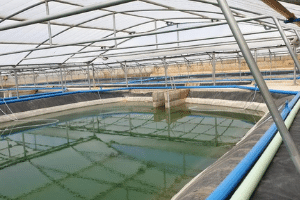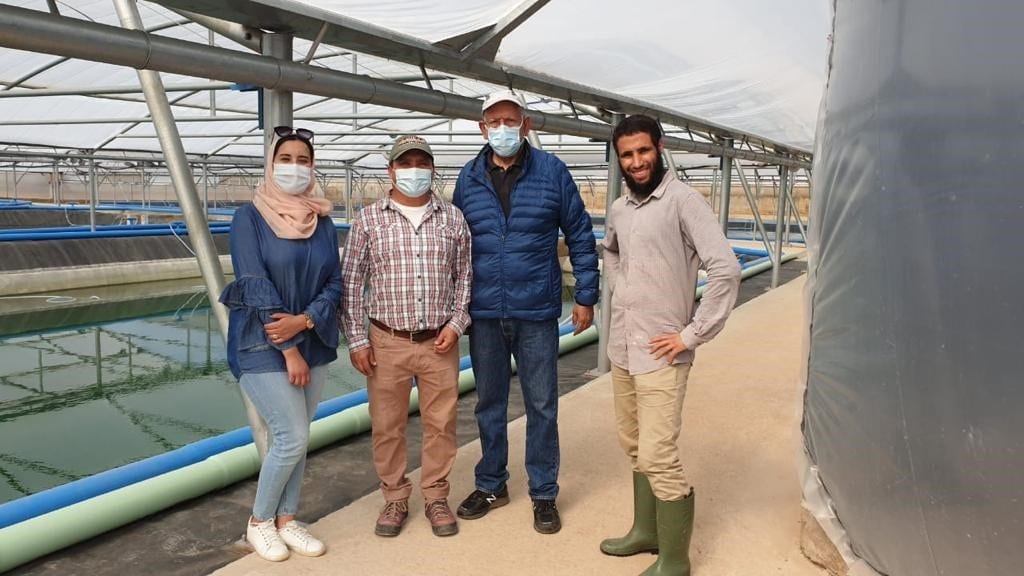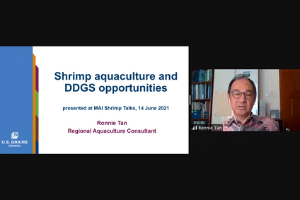Ronnie Tan, USGC regional aquaculture consultant for Southeast Asia, speaks at the recent Shrimp Talks virtual event.
When it comes to consumption of U.S. grains and co-products, land-based creatures like humans, livestock and poultry easily spring to mind. However, the U.S. Grains Council (USGC) is seeing momentum build with a new and exciting demand driver – in the water.
“USGC has worked in the aquaculture sector for nearly a decade, predominantly in the Southeast Asia region. Work has been done to promote distiller’s dried grains with solubles (DDGS) use in pangasius and tilapia diets,” said Cary Sifferath, USGC senior director for global programs. “Now with the expansion of higher protein corn co-products and even new possibilities for sorghum and barley-related proteins, our staff is working to best position DDGS and other grain co-products with the different diet demands for fresh water, salt water and shrimp diets.”
To help reach the Council’s goal of creating 1.125 million metric tons of new demand for U.S. DDGS in Southeast Asia, USGC has invested significantly in both resources and relationships to target the aquaculture sector.
In 2019, Ronnie Tan was hired as USGC’s regional aquaculture consultant for Southeast Asia to target technical education and trade servicing programs at the region’s growing industry.
Most recently, USGC co-sponsored Shrimp Talks along with USGC member companies Cargill and POET-NexPro. This event was attended by nearly 300 stakeholders and focused on supporting Indonesia’s goal of increasing shrimp exports by 250 percent in the coming years.
During the event, Tan discussed how DDGS could help the country reach this ambitious target. He also shared results from recent shrimp tank feeding trials and upcoming pond trials.
“DDGS could play a significant role in aquaculture diets as the industry shifts from animal-based ingredients to more sustainable plant-based material,” said Caleb Wurth, USGC’s assistant regional director of Southeast Asia and Oceania. “We are first proving that DDGS can perform on the farm, and then we will market this information to the industry. Engagements like Shrimp Talks are critical to our overall strategy.”
USGC is also looking beyond Southeast Asia to other parts of the globe where aquaculture provides much opportunity. For example, the Council was recently awarded a $200,000 grant from the United States Department of Agriculture’s (USDA’s) Foreign Agricultural Service (FAS) to work on aquaculture promotion programs in Morocco, with the goals of promoting investment by the Moroccan feed industry into aquaculture projects and developing the technical knowledge to produce quality aquaculture feeds for the various species under production.

The Moroccan government has an aquaculture development plan that is in its early stages, and the Council plans to use the grant to accelerate commercial aquaculture project development by showcasing successful aquaculture models from other regions of the world that can be adapted easily in the country.
In a more recent engagement in the region, a successful USGC product quality trial led one of the largest feed producers in Egypt to begin selling aqua feed produced with U.S. DDGS and corn gluten meal (CGM). Egypt is the largest aqua feed producer in the region with 34 small-to-medium aqua feed mills collectively producing 1.85 million metric tons annually. This demand for aqua feed continues to grow as the Egyptian government set an ambitious goal in 2020 to increase aquaculture production.
Learn more about USGC’s work and goals for the aquaculture sector.
About The U.S. Grains Council
The U.S. Grains Council develops export markets for U.S. barley, corn, sorghum and related products including distiller’s dried grains with solubles (DDGS) and ethanol. With full-time presence in 28 locations, the Council operates programs in more than 50 countries and the European Union. The Council believes exports are vital to global economic development and to U.S. agriculture’s profitability. Detailed information about the Council and its programs is online at www.grains.org.


